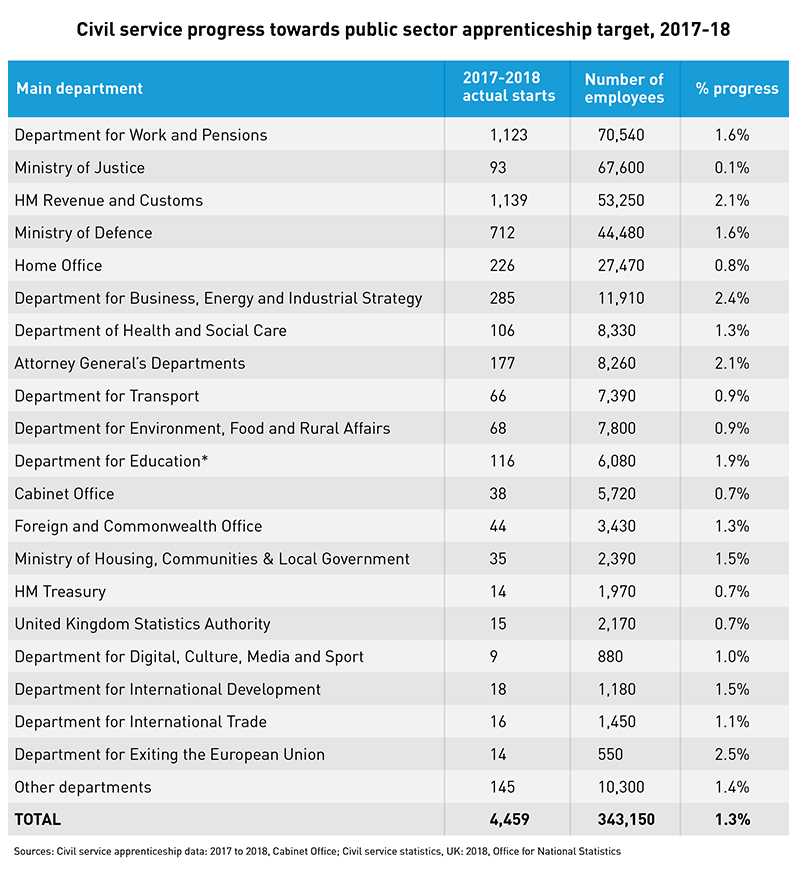The government has published its progress towards the public sector apprenticeship target for the first time – and FE Week can reveal that starts at seven departments made up less than one per cent of their workforce.
The target, which came into effect last April, obliges public sector organisations – including the civil service – to make sure that new apprentices make up at least 2.3 per cent of their overall workforce numbers on average over the next four years.
Figures published by the Cabinet Office in late September revealed there were 4,459 apprenticeship starts in the civil service for the first year of the target, which made up 1.3 per cent of a workforce totalling 343,160.
But while the data included the number of starts per department, it didn’t show progress by individual departments.
FE Week crunched the numbers, using civil service employment data published by the Office for National Statistics, to show which departments were doing well – and which weren’t.

The Ministry of Justice came out bottom, with just 93 apprentices recruited against an overall workforce of 67,600, or 0.1 per cent.
Nonetheless, a spokesperson said it was “confident” it would meet the target in the future.
The “majority of our workforce” is in the prisons, probation and courts services which “historically” haven’t used apprenticeships “so we have had to build bespoke apprenticeship programmes from scratch”, he said.
Other low-performing departments included the UK Statistics Authority, which had 15 starts out of an overall England-based workforce of 2,170 – or 0.7 per cent.
A spokesperson for the authority, which incorporates the ONS, said that apprenticeships were a “big priority” for it.
The bulk of the authority’s workforce is in Wales, where it is “currently shortlisted for a Welsh government award for its pioneering apprenticeships at the ONS Data Science Campus at Newport” – but these apprenticeships don’t count towards the target, which is England-only.
Apprenticeship starts at both the Treasury and the Cabinet Office also only made up 0.7 per cent of their overall workforce, according to our analysis.
A spokesperson for the Treasury said that apprenticeships in the areas that the majority of its staff work in – policy and economics – have only recently been developed, and it took on its first cohort of policy apprentices last month.
“With those new apprenticeships, we are confident we will be able to reach the target of 2.3 per cent by 2021,” he said.
The Cabinet Office rejected FE Week’s figures, even though they are based on official government data, and said that apprentices made up 0.8 per cent of its workforce – with a significant increase in staff numbers over the reporting period impacting on its progress.
The three other departments to have apprenticeship starts make up less than 1 per cent of their workforce in 2017-18 were the Department for Transport, the Home Office and the Department for Environment, Food and Rural Affairs.
At the opposite end of the spectrum, just two departments exceeded the target: the Department for Business, Energy and Industrial Strategy, and the Department for Exiting the European Union.
DeXEU had 14 starts out of an overall workforce at 550 (2.5 per cent), while BEIS had 285 starts out of a headcount of 11,910 (2.4 per cent).
The Department for Education had 116 starts over the year, which made up 1.9 per cent of its 6,080-strong workforce.
All public-sector organisations in England with 250 or more employees must have reported progress towards the apprenticeship target by September this year.
It’s an average target across the years 2017/18 to 2020/21 to “give flexibility to organisations to manage peaks and troughs in recruitment”, according to DfE guidance.
Government departments are grouped together as one organisation for the purpose of the target.
A government spokesperson said it was “on track to reach our target number by March 2021”.
“Apprentices are core to being a brilliant civil service, helping us to retain and attract the best talent.”
The DfE is expected to publish overall progress towards the target later this month.

